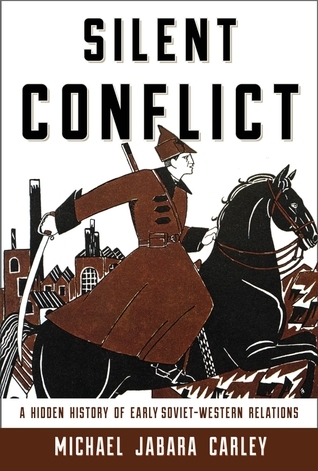
This deeply informed book traces the dramatic history of early Soviet-western relations after World War I. Michael Jabara Carley provides a lively exploration of the formative years of Soviet foreign policy making after the Bolshevik Revolution, especially focusing on Soviet relations with the West during the 1920s. Carley demonstrates beyond doubt that this seminal period—termed the “silent conflict” by one Soviet diplomat—launched the Cold War.
Carley draws on twenty-five years of research in recently declassified Soviet and western archives to present an authoritative history of the foreign policy of the Soviet state. From the earliest days of the Bolshevik Revolution, deeply anti-communist western powers attempted to overthrow the newly formed Soviet government. As the weaker party, Soviet Russia waged war when it had to, but it preferred negotiations and agreements with the West rather than armed confrontation. Equally embattled by internal struggles for power after the death of V. I. Lenin, the Soviet government was torn between its revolutionary ideals and the pragmatic need to come to terms with its capitalist adversaries. The West too had its ideologues and pragmatists. This illuminating window into the overt and covert struggle and ultimate standoff between the USSR and the West during the 1920s will be invaluable for all readers interested in the formative years of the Cold War. — Book promo @ goodreads.com

Nothing different happening here. We did get back to our routine walks yesterday after taking a day off on Tuesday. Today we went back to town again with a usual breakfast at Ella’s, groceries at Jake’s and picked up a coffee order that was delivered to General Delivery at the post office.
My book selections for the past and the next few weeks are attempts to clear my “to read” list which has become a mess. Trying to clean that up somewhat and to organize a better list moving forward. I now have books on the two eReaders and one on the Galaxy Tab A.
The other change that I have made is different browsers on the System 76 laptop and on the Galaxy Tab A tablet. I was looking for a browser for the laptop that might give me some improvement in battery life. Found LibreWolf which is a ‘fork’ from Firefox that some user claimed did that. I have only had it installed for a couple of days but it does seem to extend the battery usage time but it also seems to load websites faster than Vivaldi and I like the Bookmark organization better. I was going to install that on the tablet also but LibreWolf is not made for Android OS so have installed Mull which is also Firefox based and I like it better that the Vivaldi I was running there. I’ll see if this opinion hold true for the next week or so before giving up on Vivaldi complely.